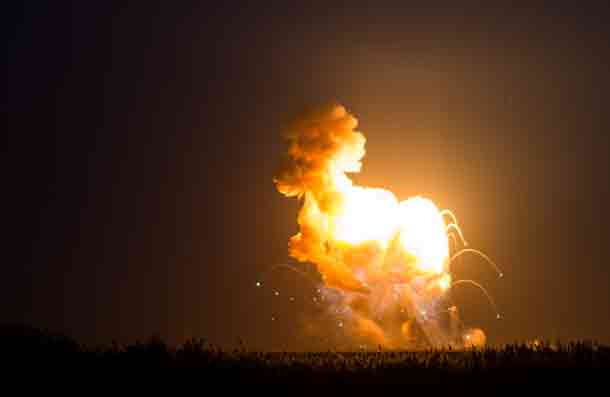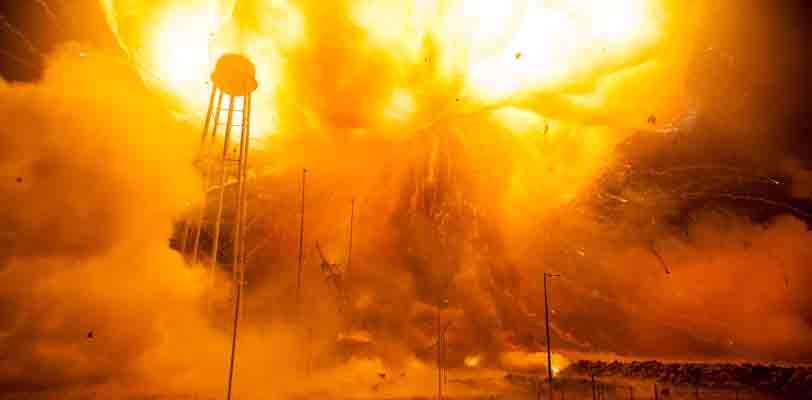ATLANTIC, Va. -- The explosion Tuesday of a NASA contractor's unmanned rocket headed to the International Space Station is a setback but not a game changer.
The destruction of an Antares rocket owned Orbital Science's Antares rocket will not compromise NASA's shift to leasing services for its human spaceflight program instead of owning its own rockets, experts said.
The cargo transporter exploded in a enormous fireball about six seconds into the flight. It fell near the launch pad. There were no injuries, but much of the material needed to pinpoint the cause was destroyed.
“While NASA is disappointed that Orbital Sciences' third contracted resupply mission to the International Space Station was not successful, we will continue to move forward toward the next attempt once we fully understand today's mishap," said William Gerstenmaier, associate administrator of NASA’s Human Exploration and Operations Directorate.
Experts will soon be eyeing the 50-year-old rocket engines Orbital Sciences purchased from the Russians. The company had plans to retire the engine.
The Soviet-era AJ-26 engine was designed in the 1960s as part of Russia’s space race with the U.S.
The engines are “refurbished and Americanized,” Frank Culbertson, the Orbital Sciences executive in charge of the NASA program, told Bloomberg News Tuesday night in a news conference.
He defended the Russian AJ-26 as "very robust and rugged" and with a successful track record.
Two years ago, Elon Musk, founder of SpaceX, ridiculed Orbital Sience's choice two years ago.
"Orbital Sciences has a contract to resupply the International Space Station, and their rocket honestly sounds like the punch line to a joke. It uses Russian rocket engines that were made in the ’60s. I don’t mean their design is from the ’60s—I mean they start with engines that were literally made in the ’60s and, like, packed away in Siberia somewhere,” Musk said in an interview in Wired Magazine.
Musk and SpaceX don' have a stellar record. In the five launches of the Falcon 1 rocket, there were three failures. SpaceX's Falcon 9 scored 13 successful launches out of 13 tries.
The next Falcon 9 launch will carry supplies to the International Space Station Dec. 9
For most of NASA's 39,000 employees, Wednesday was hump day in a dramatic week with Tuesday night's blast.
Russia successfully launched an unmanned rocket with supplies for the International Space Station from Kazakhstan, hours after a catastrophic explosion destroyed a similar mission in the United States.
A Soyuz rocket and Progress 57 cargo ship blasted off from the Baikonur Cosmodrome. The cargo ship is expected to dock with the ISS later in the day.
At mid-afternoon an Air Force Atlas V lifted off from Cape Canaveral with Global Positioning System satellite manufactured by Boeing and Lockheed Martin.
The Atlas V's first flight was in 2002, according to NASA record. Today marked the 50th launch. The only near miss with the Atlas V was in June 2007. The craft failed to reach full altitude.
Meanwhile on the International Space Station it was a routine day for Astronaut Reid Wiseman made a spectacular photo of the sun rising with the curvature of the Earth clearly displayed.
Wiseman wrote on twitter, "Not every day is easy. Yesterday was a tough one. #sunrise"
Wiseman was referring to the loss of the Antares rocket and Cygnus spacecraft, moments after launch at NASA's Wallops Flight Facility in Virginia. The Cygnus spacecraft was filled with 5,000 pounds of supplies slated for the International Space Station, including science experiments, experiment hardware, spare parts, and crew provisions.
The station crew is in no danger of running out of food or other critical supplies NASA said.
 The blast on the horizon was a setback. NASA photo
The blast on the horizon was a setback. NASA photo



